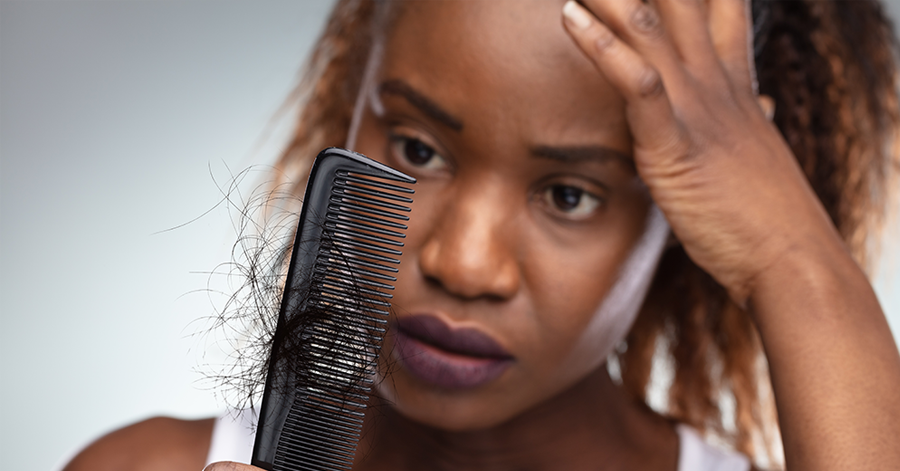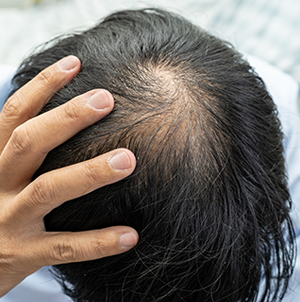The Many Causes of Hair Loss And How Can It Be Treated

Have you noticed that your daily hair loss is increasing? Are you concerned about your hair loss? Whether hair loss is a new concern or an ongoing condition, you are not alone. Hair loss (alopecia) is one of the most common concerns we diagnose and treat at BAXT CosMedical®. Dr. Rebecca Baxt, a board-certified dermatologist, is specially trained to diagnose and treat challenging hair diseases.
Many people believe that hair loss only affects your scalp, but many also experience hair loss on their entire body. The most common type of hair loss reported by men and women is hormonal hair loss or androgenetic alopecia.
Hair loss can be due to age, heredity, specific medical conditions, hormonal imbalances, medications, or due to how a person cares for their hair. Hair loss affects women, men, and children.
Read Dr. Baxt’s blog posts about hair loss: “Is Hair Loss Inevitable” and “Top 5 Reasons for Hair Loss”.
Read Dr. Baxt media interview on hair loss in African Americans, “Losing Your Hair? Here’s How to Hold on to It. Dr. Rebecca Baxt interviewed on hair loss” – Sisters, AARP
Listen to Dr. Rebecca Baxt’s Podcast on Hair Loss
What Are The Most Common Types Of Hair Loss In Men And Women?
Everyone loses hair daily. This is because it is a normal part of the hair growth cycle. According to the American Dermatology Association, “it’s normal to shed between 50 and 100 hairs a day”1. When the body sheds significantly more hairs every day, a person has excessive hair shedding. There can be many reasons for increased shedding.
If you begin to see thin spots on your scalp or bald patches, you could be suffering from a common hair loss medical condition. The onset of hair loss could be due to many factors some of which are:
- Heredity
- Autoimmune conditions
- Illness
- Cancer treatments
- Extreme emotional states
- Poor nutrition or rapid weight loss
- Post-Pregnancy
- Medications
- Hair styling
 However, the most common type of hair loss reported by patients is due to heredity. Hair loss affects men and women. Many people are primarily familiar with male-pattern baldness, but it affects both sexes.
However, the most common type of hair loss reported by patients is due to heredity. Hair loss affects men and women. Many people are primarily familiar with male-pattern baldness, but it affects both sexes.
Male-pattern baldness is the most common cause of hair loss in men as they typically have inherited the trait.
What Are Some other Medical Hair Loss Conditions?
Medical names for hair loss conditions are as follows:
- Androgenetic alopecia – thinning or baldness due to genetics and hormones. This condition is the most common and affects both men and women. Men typically notice an increasing bald spot on the top of the head and a receding hairline. This condition is referred to as male-pattern baldness. Women typically see thinning on the top of the scalp.
- Stress induced hair loss – Many omen experience hair loss after having a child. This type of hair loss is called telogen effluvium.
- Alopecia areata – this disorder is believed to be caused by an autoimmune disease. Simply stated, it is when the body’s immune system attacks its own hair. With this condition you will see round patches of hair loss on the scalp and sometimes elsewhere on the body.
- Cicatricial (scarring) alopecia – this disorder is rare as it destroys a person’s hair follicles. Scar tissue then forms which blocks growth of new hair follicles.
- Central centrifugal cicatricial (scarring) alopecia – this condition is seen most often in African American women. It starts in the center of the scalp and progresses outward.
How Is Hair Loss Treated?
Diagnosing the cause of hair loss can be complicated as there are many variables. To accurately diagnose hair loss and prescribe an effective treatment, a consultation with a board-certified dermatologist is required. Dr. Rebecca Baxt begins with an extensive health history to identify the potential causes of your specific hair loss problem. She will also examine your scalp and hair. An in-office scalp biopsy can be performed, if needed to pinpoint the exact nature of your hair loss condition.
Once a diagnosis has been obtained, treatments can be recommended including medication. It’s important to note that no one treatment works for everyone. To find one that helps, Dr. Baxt will try a few types of treatment or different medications, or she may recommend ProGen PRP™.
Revolutionary Hair Restoration Treatment… PRP Used to Treat Thinning Hair and Hair Loss

After many years and careful consideration of PRP systems, Dr. Rebecca Baxt selected the ProGen PRP™ system. This proprietary PRP system and medical device is an FDA-cleared 510(k) Class II medical device.
PRP is the medical process of using one’s own blood which is processed to separate red and white blood cells from platelets to produce a concentrated solution of plasma containing growth factors from the platelets that are injected back into your scalp. These highly concentrated growth factors stimulate your own body to recruit hair follicles and stimulate them to grow. PRP is an effective procedure that stimulates hair growth in men and women.
See B&A Photos of Hair Restoration Patients

Is PRP Hair Loss Restoration Safe?
Platelet-Rich Plasma (PRP) is produced from your own blood so there is virtually no risk of an allergic reaction or rejection. After many years and careful consideration of PRP best practices and systems, Dr. Rebecca Baxt selected the ProGen PRP™ system.
ProGen PRP™ is manufactured in the United States and all of the kits are individually packaged. ProGen PRP™ is a US FDA 510k cleared Platelet Rich Plasma system.
If you have tried popular over-the-counter treatments, such as, minoxidil (found in hair care products) to hand-held laser/light sources (found in brushes and other devices) but are still experiencing hair loss, schedule a consultation with a BAXT CosMedical® dermatologist.
Dr. Rebecca Baxt can expertly diagnosis your hair loss and/or thinning condition and recommend an appropriate treatment. Contact us or call (201)265-1300 today!

